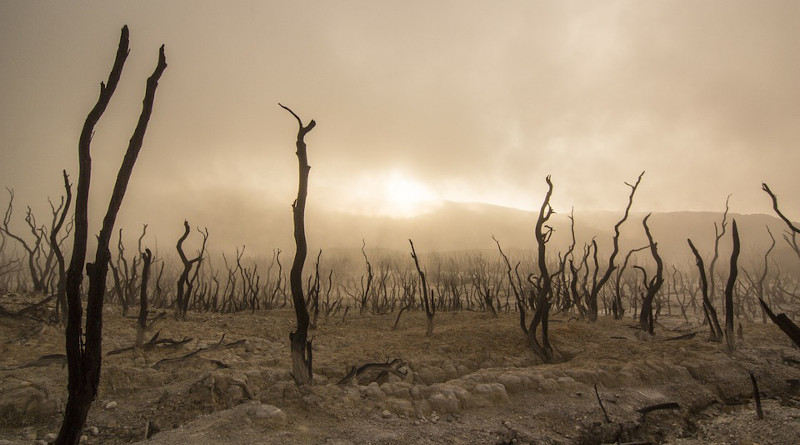When The Trees Go, So Will We – OpEd
I don’t know what more can I say about trees so people will spare them. I have written many of articles why we should save them. And, I have done what I can to protect them. I’ve spent years of my life growing and planting them.
I always looked at trees as stalwarts: sturdy, reliable sources of beauty and cooling shade that we shamelessly took for granted. Trees took care of themselves, rarely asking much from us outside of the occasional trim. Now they seem to be the woody equivalent of canaries in the coal mine, telling us in the most dramatic way possible that our planet is terribly, terribly sick by dying themselves.
Last Friday, a walk to my hometown Baguio starkly faces me the grim reality — gone are the trees, buildings have taken over … along suburban streets, I see bare limbs and toppled trunks. When I look chance on a pine tree, the needles are brown dead, I no longer see a graceful canopy of green; I see death.
I am in despair over the formerly uncomplicated relationship I had with trees for most of my life; I am struggling to understand how to find some remnant of joy in their presence now that I mourn their questionable future and humanity’s role in making it so risky.
I have decided to grieve each dead tree I see as if it was a personal friend. Early this morning I heard a sound that’s become all too familiar: the roar of chainsaws as DPWH workers cut down pine trees along Longlong road just to put up a riprap which was not needed.
I knew the trees would be killed because driving home yesterday I saw DPWH workers number and tag the trees for removal. I stopped and asked why. “ I only work here, ask the guvmint,” the man sharply retorted.
So after dinner last night I let loose Sadam and we went for a walk up the street to say goodbye to these beloved neighbors of mine. They are gorgeous every late summer evening, lit by a super moon still tinged with orange. The Jiminy crickets hummed their familiar chorus. I stopped under the trees and looked up.
Saddam eyed me questioningly.
Is it hokey to thank a mute being for everything it’s done for you?
For oxygen? For cooling shade? For providing a home for birds? Sure, it’s hokey. But I think we need to collectively start grieving the loss of each and every tree. It’s only when we name our grief that it can begin to transform us instead of numbing us.
I performed a simple ritual for the trees as I have done for thousands of trees killed by the government, corporate murderers, real estate savages and heart-tearing loggers. I put my hands on their barks. I felt the rough texture under my skin. I looked up into the canopy, the trunks a bit shaky, perhaps aware of their impending death, but still breathtaking in their shape and structure. I imagined them over a hundred years ago as saplings, long before the street and houses even existed.
I haven’t attended Mass in years, but I blessed it with a prayer asking God to let them go without pain. Making the strokes with my thumb is my way of saying: your life mattered. Your contributions were generous. You will be missed. And during absolute heartbreak, I celebrated a moment of exquisite pain: I am still alive. I can make a difference in the name of this tree. I must.
I can feel the despair that comes from living on a planet seemingly in its death throes. Part of my response to grief is to name it, honor it, and learn to live in its shadow; part of our response must be to find some small measure of healing through action. To remind us of the potential of sorrow to change us for the better.
After all, grief has a tremendous power. When we submerge it in avoidance, we can use it for spiritual growth. I allow grief’s power to propel me.
My grief has propelled me to an unexpected place to continue my vigil of farewell to the dead and dying trees in my community, I am propelled to keep fighting for trees.
Then I do something unexpected, wild with savagery as the animal in me instincts. I shout. Saddam growls. I ask the ghosts of the forests and the souls, the spirit guardians to hear me. I murmur my chants. I want them to take vengeance for my dead and dying brothers and sisters.
Because I am part of the forest, of the mountain, of the land.
We cannot take death sitting down, when our very existence and those of the future, are threatened.
I cannot bring back the trees that are gone. The loss of the trees on the hills of my beloved Baguio, I will never recover from. But out of that sadness can come a sense of hope.
Tomorrow, with my aching back and limp, I will pull my run-down boots, don my dilapidated raincoat and go back to my audacious ritual of planting trees.


I share your grief and rue that we are unable to do anything to save ourselves. The planet, the trees are not in danger, we are in danger. Once we are extinct, the planet will heal itself and be green & blue again.